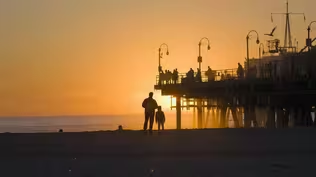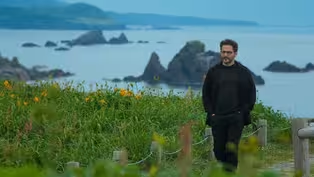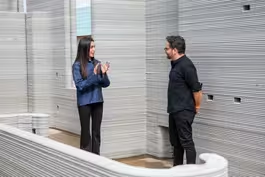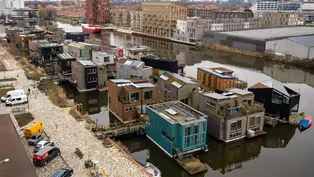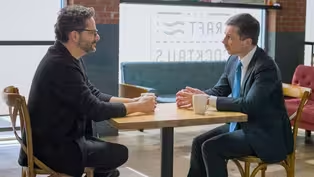
The Power of Deliberative Democracy
Clip: Episode 5 | 8m 52sVideo has Closed Captions
Ari explores forms of deliberative democracy around the world that empower citizens.
Ari explores the power of deliberative democracy, where citizens are actively involved in decision-making processes. Ari speaks with the French president Emmanuel Macron about the country’s use of citizen conventions to address major challenges and how they can serve as an example of how this approach can work.
Problems playing video? | Closed Captioning Feedback
Problems playing video? | Closed Captioning Feedback
Supported by the Hoveida Family Foundation and The Rosalind P. Walter Foundation.

The Power of Deliberative Democracy
Clip: Episode 5 | 8m 52sVideo has Closed Captions
Ari explores the power of deliberative democracy, where citizens are actively involved in decision-making processes. Ari speaks with the French president Emmanuel Macron about the country’s use of citizen conventions to address major challenges and how they can serve as an example of how this approach can work.
Problems playing video? | Closed Captioning Feedback
How to Watch A Brief History of the Future
A Brief History of the Future is available to stream on pbs.org and the free PBS App, available on iPhone, Apple TV, Android TV, Android smartphones, Amazon Fire TV, Amazon Fire Tablet, Roku, Samsung Smart TV, and Vizio.
Buy Now
Providing Support for PBS.org
Learn Moreabout PBS online sponsorship[gentle music] - We are the only species in the animal kingdom with the ability to blush, which is, I think, a telling fact.
We involuntarily give away our feelings to other members of our species in order to establish trust.
We are the only species among primates with white eyes, right?
So that means people can see-- I'm looking in the camera right now.
If I was a chimpanzee, that would have been much more difficult.
I'm looking to the left.
Now I'm looking to the right.
So I'm involuntarily giving away my gaze, which, again, helps to establish trust.
So it's in our biology.
It's in our DNA that we've been optimized for trust.
- You want to feel like the social system of which you're a member and a participant has something legitimate, fair, desirable, good, something worthy about it.
We want to feel like our sports team is better than the other sports teams.
We want to feel our town or our city is better than others or our university or college is better than others.
It could also be a racial or ethnic group or other kinds of social groups.
That's where the tribalism comes in.
- We have created systems that increase the distance between people, increases the distance between people on the work floor and the managers, between the citizens and the politicians.
The longer the distance becomes, both physical distance and psychological distance, the more difficult it becomes to trust one another.
So that's what we have.
We have a deepening crisis of trust.
[dramatic music] - Listen, why must we divide?
Why are we dividing people?
[shouting] [both speaking native language, glass clattering] - You're completely destroying our city!
You come down-- [both shouting in native language] - Things got so heated that the board members eventually walked out, leaving the police to deal with the unruly crowd.
- I was so disgusted, like, that people would do this.
- Close the border!
Close the border!
Close the border!
- 20 years!
- You're just screaming.
- I wasn't screaming!
- Come on!
No one's giving me free food.
No one's giving me free housing.
- We do a tax-- - I need order.
[gavel banging] - Right?
This is what everyone does.
[overlapping chatter] - Okay.
Time-out.
Time-out.
[chatter continues] ♪ ♪ [gentle music] - We've always had disagreements, but something more serious is happening here.
The ideas and institutions that govern our societies, long taken for granted, have begun being challenged in new and unsettling ways.
Here at Stanford University, Alice Siu is working with her team at the Deliberative Democracy Lab to better understand where we are right now and what we can do to create lasting change moving forward.
What is the state of democracy today?
- Many will say democracy is in crisis.
A lot of democracies around the world are backsliding, and we have trouble trying to figure out what a lot of people actually want, what kind of system of government people want to live in.
But I think, as of today, a lot of people are concerned about whether their voices are being heard and if people are really representing their likes and dislikes.
- But Alice also sees an opportunity here, a chance for new and needed ideas around how to improve our democracies in order to better face the future and engage directly with the citizens they serve.
A growing set of ideas known as deliberative democracy are beginning to take hold in countries around the world... like here in France, where they've started holding citizen conventions--forums designed to better engage their citizens in addressing the major challenges and opportunities before them.
So how did this all first come about here in France?
- Look, I mean, first, we had this yellow vest crisis in France, a crisis of working classes in France.
You have a lot of fears and anxieties, climate change, digitalization, geopolitics.
And a lot of people in small cities and so on having this feeling not to be respected by our policies, not to have a place anymore in this world, and not to be prepared for this change.
So I made this tour, and I launched a series of citizen conventions.
On a random basis, you take 100, 200 citizens and you formulate a question.
You put them in a situation to have a lot of interactions with experts.
They propose a solution, which is based on a consensus and collective intelligence and ability to understand the complexity of the problem.
So I did it on climate change.
It worked because we passed a law after that largely inspired by the citizen convention, and the feedback was very positive.
They learned.
They were very committed, but they respected each other.
But for me, this is a constant work in progress because it's never perfect.
But where I'm really optimistic is that you can have emotions, positive and negative, and argumentation and rational discussion to be merged together regarding our collective future.
- Back in the U.S., Alice and her team have pioneered something with similar ideas in mind.
Your team put together an event called America in One Room.
What was that?
- It was a four-day-long deliberative poll, where we gathered a nationally representative sample.
We flew them in to Dallas, Texas, from across the country.
There were 523 people that came from all walks of life, and they gathered together in small groups.
They deliberated about immigration, economy, foreign policy.
And for four days, they discussed in their small groups about these topics.
And then they had panels of experts.
And, actually, five then-presidential candidates answer their questions.
What we learned from 500-plus people is that people can and will change their minds after just four days of being with each other.
We learned that those that may have had extreme positions on either side of the spectrum actually moderated and became closer to each other.
We learned that after deliberation together, they liked each other more.
They came to understand why the other person held certain views.
- I think, especially on a local basis, we have to find a way to involve citizens, make them much more player of the game and doer of our democracies.
- Paint a picture for me of the democracy that you want to see.
- We don't have to live like this today.
We can change it now, and we can have those conversations that build empathy.
We can have those structured conversations.
We can build those skills.
And if we just start somewhere and not wait, then we can really get to that future where everyone actually listens to each other and our democracy is held together by everyone that's involved.
[applause] - It's the organization of humanity, the self-organization of humanity which is the key change that needs to happen.
Now, we live in this extraordinary situation where a tiny number of people which calls itself a government claims to be able to control this complex system that we call society from the center.
There is no complex system on Earth that can be controlled from the center.
It can't possibly work.
And yet at the same time, we have this tremendous capacity for participatory, for deliberative democracy, where we can come together and make decisions together for the good of all.
And where we've been allowed to do this, if only on a small scale or a partial scale, the results have been extraordinary.
[weapon fires] - I think it's quite clear that we are living through probably the most dangerous century in the history of our species.
It could also be the most prosperous century and the most exciting century to be alive.
What we need are people who are willing and able to look forward to a future that could be so, so much better than the world we live in today.
Video has Closed Captions
Preview: Ep5 | 30s | How can we create futures that serve the needs of all people? (30s)
Video has Closed Captions
Clip: Ep5 | 1m 26s | 3D printed homes pose a potential solution to addressing the growing housing crisis. (1m 26s)
The Future of Sustainable Housing
Video has Closed Captions
Clip: Ep5 | 9m 35s | Ari explores better, more sustainable ways of living together going forward. (9m 35s)
The Vital Importance of Better Infrastructure
Video has Closed Captions
Clip: Ep5 | 3m 4s | Building better cities and transportation can influence human connection and cooperation. (3m 4s)
Providing Support for PBS.org
Learn Moreabout PBS online sponsorshipSupport for PBS provided by:
Supported by the Hoveida Family Foundation and The Rosalind P. Walter Foundation.
